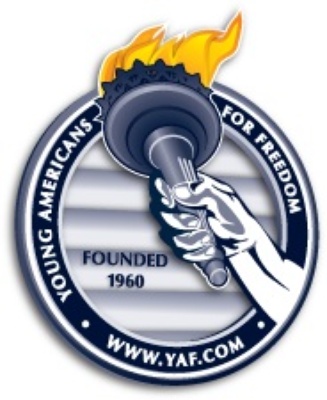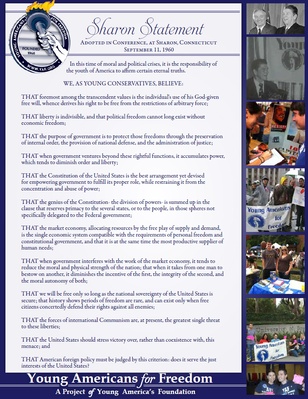 "YAF (Young Americans for Freedom) Logo"
"YAF (Young Americans for Freedom) Logo"
| Location |
| TBA] . |
| Hours |
| TBA |
| Website |
| Like us on FacebooK! |
| Young Americans For Freedom Official Website |
Young Americans for Freedom (YAF) is a 501(c)(3) non-profit organization and is now a project of Young America's Foundation. YAF is an ideologically conservative youth activism organization. The Young Americans for Freedom brings on campus political activism, fighting for Conservatives causes, while avoiding the partisan bickering of the 2 party system. Young Americans for Freedom's goal at UC Davis is to provide a more Conservative alternative to the College Republican group on campus, free of the rigid orthodoxy of partisan politics. The Davis YAF only recently launched, as of April 2012, providing a much needed Conservative Voice on a liberal campus, which has seen its College Republican group drift in a different direction.
If you have any questions, free free to email us at davisyaf[at]gmail.com. If you are in joining the fight with us, please also, feel free to inquire about how you can get involved in Campus Activism based on issues. The UC Davis Chapter was founded in April 2012. Being a 501(c)(3) non-profit organization, it cannot endorse any candidates, nor will it endorse any candidates.
Much of what is written here is taken from wikipedia
History
Davis History
The Davis YAF is a new organization to Campus, bringing a Conservative alternative to the College Republicans, without the blatant Partisanship of College Republicans. Davis YAF provides a place for Conservatives to rally who want to focus on issue-based activism. The UC Davis Chapter was founded in April 2012. Being a 501(c)(3) non-profit organization, it cannot endorse any candidates, nor will it endorse any candidates. It has not been officially registered with UC Davis yet.
Parent Organization
YAF is an ideologically conservative youth activism organization that was founded in 1960, as a coalition between traditional conservatives and libertarians.
Mission
Official Statement
The purposes of YAF are to advocate public policies consistent with the Sharon Statement, which was adopted by young conservatives at a meeting at the home of Mr. William F. Buckley in Sharon, Connecticut on September 11, 1960; To promote social welfare and individual freedom; To study any legislation from any governmental bodies or agencies that seek to affect social and economic problems of the individual; To support the preservation and enhancement of individual freedom for all Americans; To provide aid and information to students and such young adults throughout the nation to assist them in achieving and maintaining the ideological realization of the beliefs in the Sharon Statement; and to maintain and operate a chapter based organization with national, regional and local networks throughout the United State of America.
UC Davis Chapter Statement
Previously, Young Americans for Freedom played a vital role in the development of the modern Conservative movement. We want to bring that to UC Davis, encouraging young college students to fight for Conservative values, and become individuals who create other branches of Conservative groups, or become leaders in the Conservative movement, such as former YAF Members: Jeff Sessions (Republican US Senator), or Mark Levin (Conservative talk show host).
Sharon Statement
IN THIS TIME of moral and political crisis, it is the responsibility of the youth of America to affirm certain eternal truths. WE, as young conservatives, believe: THAT foremost among the transcendent values is the individual's use of his God-given free will, whence derives his right to be free from the restrictions of arbitrary force; THAT liberty is indivisible, and that political freedom cannot long exist without economic freedom; THAT the purpose of government is to protect those freedoms through the preservation of internal order, the provision of national defense, and the administration of justice; THAT when government ventures beyond these rightful functions, it accumulates power, which tends to diminish order and liberty; THAT the Constitution of the United States is the best arrangement yet devised for empowering government to fulfill its proper role, while restraining it from the concentration and abuse of power; THAT the genius of the Constitution - the division of powers - is summed up in the clause that reserves primacy to the several states, or to the people in those spheres not specifically delegated to the Federal government; THAT the market economy, allocating resources by the free play of supply and demand, is the single economic system compatible with the requirements of personal freedom and constitutional government, and that it is at the same time the most productive supplier of human needs; THAT when government interferes with the work of the market economy, it tends to reduce the moral and physical strength of the nation, that when it takes from one to bestow on another, it diminishes the incentive of the first, the integrity of the second, and the moral autonomy of both; THAT we will be free only so long as the national sovereignty of the United States is secure; that history shows periods of freedom are rare, and can exist only when free citizens concertedly defend their rights against all enemies… THAT the forces of international Communism are, at present, the greatest single threat to these liberties; THAT the United States should stress victory over, rather than coexistence with this menace; and THAT American foreign policy must be judged by this criterion: does it serve the just interests of the United States?"
Philosophy
Since its founding, YAF continuously identified itself as "conservative". However, the term "conservative" has changed in meaning over several generations. Before World War II, most American conservatives were non-interventionist. But as the Cold War began to dominate American foreign policy, the old conservatism disintegrated. After Robert Taft was defeated for the Republican nomination in 1952, non-interventionist conservatism mostly vanished. In the 1950s, a new kind of conservatism arose. This new ideology was formulated in large part by the newspaper Human Events, the magazine National Review, and National Review's editor William F. Buckley, Jr. This new conservatism combined free-market economics, respect for traditional values, orderly society and anti-communism.
In the late 1960s, the term libertarianism began to be used for a political philosophy. Many of those who popularized this term were initially part of the conservative movement, but came to separate themselves from the conservatives on certain issues. Libertarians within YAF believed, for example, the military draft was a violation of the individual freedom the organization claimed to embrace. To oppose it they were willing to reject existing laws against burning draft cards and supported those who fled to Canada or went underground when drafted for military service. The conservatives (or traditionalists as they were sometimes called)also opposed the draft directed their efforts towards changing the law. In the end, the goals of both groups were achieved, and YAF was "in the forefront of the drive to end the draft and create a volunteer military." After 1969, the relationship between conservatives and libertarians in YAF was often rocky. A majority of members identified themselves simply as conservative, but some identified as both conservative and libertarian, and still others identified themselves simply as libertarian. From time to time, power struggles broke out; when this happened, the libertarians almost always ended up losing.
In later years, new viewpoints would be amalgamated by the conservative movement, including neoconservatism in the early 1970s, the New Right in the late 1970s and the Religious Right in the 1980s. Some YAF members identified with some of these philosophies, others opposed them and still others were content to simply identify themselves as conservative without further specificity.
Since its founding, YAF members on college campuses focused primarily on national and international politics, rather than on-campus politics. Thus members were much more likely to pass out handbills for a candidate for Congress than for student body president.




